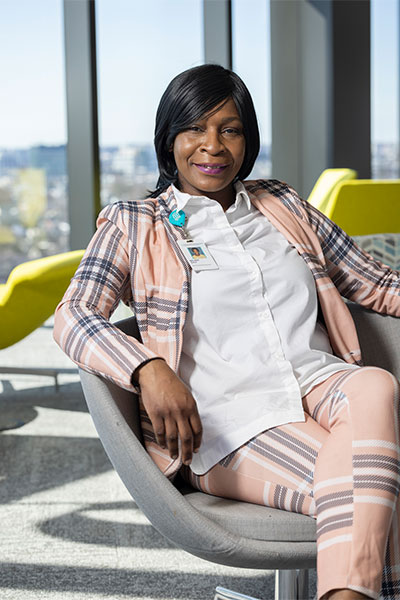Connect to Capacity: Treating Patients and Colleagues As Family
Alysia Monaco, AGACNP-BC of MGH Cardiac Surgery, discusses treating patients and colleagues like family.
News3 Minute ReadApr | 10 | 2024
When there are more patients than available beds, those waiting in the MGH Emergency Department for admission may end up on a stretcher in the hallway – sometimes for hours.
“Those people waiting – they aren’t numbers on a screen. They’re humans,” says Malinda Buck, a patient access bed manager supervisor in the MGH Capacity Center. “It could be my mother. It could be yours. And I don’t want anyone’s mother stuck in the hall.”

Buck is determined to be a part of the solution. She does so by using her 20 years of institutional knowledge along with determination, empathy, and kindness to get patients where they need to be: in rooms, healing, and then going home.
For Buck, each day begins by reading a report which gives a snapshot of the hospital’s capacity. She then attends meetings with medical and administrative stakeholders to discuss projections for the day. After that, the games begin.
“It’s like playing Tetris, or Jenga. Figuring out what fits where,” she says. “On a given day, we may need 70 beds. We may only have 30 available. How can we make this work? We look at priorities such as how sick the patients are, where they’re coming from, where they’re going. And then, we figure out ways to balance.”
To tackle these issues, Buck works with people and departments across MGH to ensure the hospital can accommodate patient needs. She knows who to call and what to ask.
“Malinda approaches capacity challenges with kindness, laughter, and infectious optimism,” says Katherine Takvorian, MD, attending physician and Internal Medicine Medical Officer of the Day. “She is also a wealth of knowledge about admitting resources, policies, and workflow. Malinda just handles it all.”
A typical scenario Buck works to address:
A patient is classified as “COVID assumed” in the ED, which means they are kept isolated while waiting for a bed in a single occupancy room. Due to capacity challenges, the wait stretches past 15 hours. Buck gets to work. She will know a COVID test was likely done, with results likely back, so she calls to find out if the patient is COVID positive. If so, the patient can be moved to a double occupancy room with another COVID patient, freeing up space both in the ED and in the would-be single occupancy room.
“Malinda is a problem solver,” says Jonathan Wing, of MGH Internal Medicine. “And the best part is, she’s a great person, bringing much-needed positive energy to work that can often be very tense and complicated.”
Buck says being positive is the easiest part of the situation.
“The expression is true: You get more with honey than you do with vinegar. I do try to be nice. It’s one thing in life that doesn’t cost a thing,” Buck says.
Alysia Monaco, AGACNP-BC of MGH Cardiac Surgery, discusses treating patients and colleagues like family.
Amber Moore, MD, director of Inpatient Medicine in the Department of Medicine, is working to improve the process of patients seeking to transfer in from other care facilities.
Erin Hachey, RN, of Bigelow 11, and Ben Orcutt, director of MGH Patient Access Services, work together daily to mitigate capacity challenges, yet they typically only communicate through an app called Voalte.
Alysia Monaco, AGACNP-BC of MGH Cardiac Surgery, discusses treating patients and colleagues like family.
Amber Moore, MD, director of Inpatient Medicine in the Department of Medicine, is working to improve the process of patients seeking to transfer in from other care facilities.
Erin Hachey, RN, of Bigelow 11, and Ben Orcutt, director of MGH Patient Access Services, work together daily to mitigate capacity challenges, yet they typically only communicate through an app called Voalte.
Alysia Monaco, AGACNP-BC of MGH Cardiac Surgery, discusses treating patients and colleagues like family.